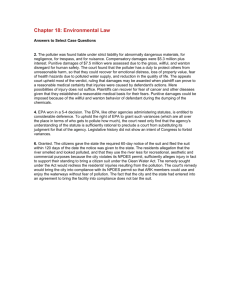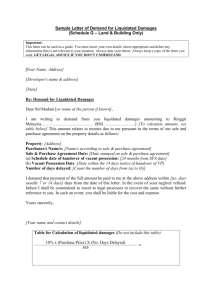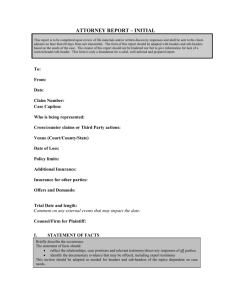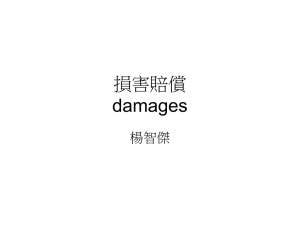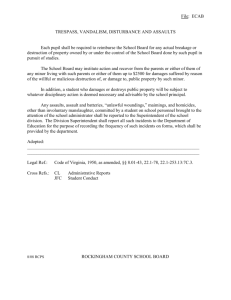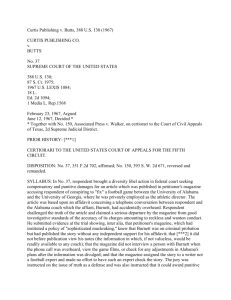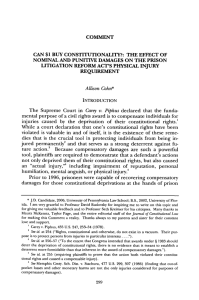RTF format
advertisement
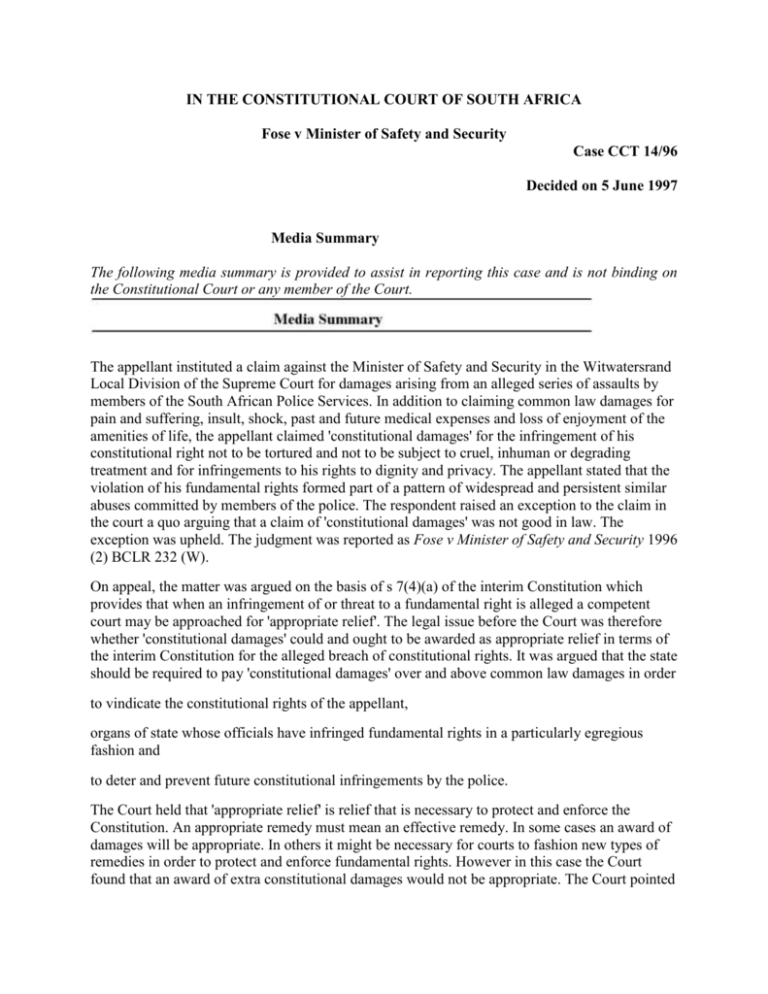
IN THE CONSTITUTIONAL COURT OF SOUTH AFRICA Fose v Minister of Safety and Security Case CCT 14/96 Decided on 5 June 1997 Media Summary The following media summary is provided to assist in reporting this case and is not binding on the Constitutional Court or any member of the Court. The appellant instituted a claim against the Minister of Safety and Security in the Witwatersrand Local Division of the Supreme Court for damages arising from an alleged series of assaults by members of the South African Police Services. In addition to claiming common law damages for pain and suffering, insult, shock, past and future medical expenses and loss of enjoyment of the amenities of life, the appellant claimed 'constitutional damages' for the infringement of his constitutional right not to be tortured and not to be subject to cruel, inhuman or degrading treatment and for infringements to his rights to dignity and privacy. The appellant stated that the violation of his fundamental rights formed part of a pattern of widespread and persistent similar abuses committed by members of the police. The respondent raised an exception to the claim in the court a quo arguing that a claim of 'constitutional damages' was not good in law. The exception was upheld. The judgment was reported as Fose v Minister of Safety and Security 1996 (2) BCLR 232 (W). On appeal, the matter was argued on the basis of s 7(4)(a) of the interim Constitution which provides that when an infringement of or threat to a fundamental right is alleged a competent court may be approached for 'appropriate relief'. The legal issue before the Court was therefore whether 'constitutional damages' could and ought to be awarded as appropriate relief in terms of the interim Constitution for the alleged breach of constitutional rights. It was argued that the state should be required to pay 'constitutional damages' over and above common law damages in order to vindicate the constitutional rights of the appellant, organs of state whose officials have infringed fundamental rights in a particularly egregious fashion and to deter and prevent future constitutional infringements by the police. The Court held that 'appropriate relief' is relief that is necessary to protect and enforce the Constitution. An appropriate remedy must mean an effective remedy. In some cases an award of damages will be appropriate. In others it might be necessary for courts to fashion new types of remedies in order to protect and enforce fundamental rights. However in this case the Court found that an award of extra constitutional damages would not be appropriate. The Court pointed out that if the appellant succeeded in proving that he was indeed assaulted by members of the police, he would be awarded substantial compensatory damages. In the result his constitutional rights would be effectively vindicated. The Court also found that in the circumstances of this case punitive damages would be inappropriate. The Court was not satisfied that punitive damages against the government would significantly deter the type of abuses that were alleged to have occurred. Nothing in South Africa's recent history, where substantial monetary awards for death and brutality in detention were given, suggests that this had any preventative effect. Moreover, in order to deter the government the awards of damages would have to be very substantial. This would mean that the plaintiff would get a large amount of money over and above the compensatory damages to which he or she is entitled under the common law. The taxpayer would ultimately have to pay these extra damages. According to the Court it was inappropriate to use the country's scarce resources to pay punitive damages to plaintiffs who have already been fully compensated for the injuries done to them with no real assurance that such payment will have any deterrent or preventative effect on the state in the future. According to the Court awards of punitive damages in civil cases are problematic in principle as they inflict punishment without the persons being punished having the benefit of their constitutional / criminal law rights. The appeal was therefore dismissed. The judgement of the Court was delivered by Ackermann J and was concurred in by Chaskalson P, Mahomed DP, Langa J, Madala J, Mokgoro J and Sachs J. O'Regan J concurred in Ackermann J's judgment with one reservation. Didcott J and Kriegler J delivered separate judgements concurring in the order of the Court.


